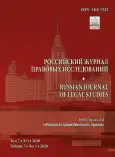Использование сценарного подхода в процессах управления противодействием коррупции (на примере строительной отрасли)
- Авторы: Шульц В.Л.1, Кульба В.В.2, Шелков А.Б.2, Чернов И.В.2, Тимошенко А.А.3
-
Учреждения:
- Центр исследования проблем безопасности Российской академии наук
- Федеральное государственное бюджетное учреждение науки Институт проблем управления имени В.А. Трапезникова Российской академии наук
- Федеральное государственное казенное образовательное учреждение высшего профессионального образования "Университет прокуратуры Российской Федерации"
- Выпуск: Том 7, № 1 (2020)
- Страницы: 64-77
- Раздел: Противодействие коррупции
- Статья получена: 08.07.2020
- Статья одобрена: 08.07.2020
- Статья опубликована: 07.08.2020
- URL: https://journals.eco-vector.com/2410-7522/article/view/34992
- DOI: https://doi.org/10.17816/RJLS34992
- ID: 34992
Цитировать
Полный текст
Аннотация
Работа посвящена методологическим и прикладным проблемам повышения эффективности процессов управления
противодействием коррупции. Приведены результаты анализа сущности и форм коррупционных проявлений, а также их негативного влияния на темпы поступательного социально-экономического развития государства и общества.
Для повышения эффективности решения прикладных и практических задач, связанных с противодействием коррупции, предложено использовать методологию сценарного анализа, обеспечивающую возможность оценки качества подготовки и реализации решений в рамках управления рассматриваемыми процессами.
Представлены результаты сценарного исследования разработанных базовых мультиграфовых моделей управления противодействием коррупционным проявлениям (на примере строительной отрасли) с использованием аппарата функциональных знаковых ориентированных графов.
По результатам проведенного анализа появляется возможность более широко взглянуть на криминологическую проблему противодействия коррупции, связав ее решение с разработками в области экономики, социологии и психологии.
Публикация рассматривается в качестве нового подхода к разработке конкретных мер противодействия данному виду преступления.
Полный текст
Об авторах
Владимир Леонидович Шульц
Центр исследования проблем безопасности Российской академии наук
Автор, ответственный за переписку.
Email: lbogat@mail.ru
SPIN-код: 9962-3002
доктор философских наук, член-корреспондент РАН, заслуженный деятель науки Российской Федерации, лауреат премии Правительства Российской Федерации в области образования, научный руководитель
Россия, МоскваВладимир Васильевич Кульба
Федеральное государственное бюджетное учреждение науки Институт проблем управления имени В.А. Трапезникова Российской академии наук
Email: lbogat@mail.ru
SPIN-код: 4491-2860
доктор технических наук, профессор, заслуженный деятель науки Российской Федерации, главный научный сотрудник
Россия, МоскваАлексей Борисович Шелков
Федеральное государственное бюджетное учреждение науки Институт проблем управления имени В.А. Трапезникова Российской академии наук
Email: lbogat@mail.ru
SPIN-код: 4961-7347
кандидат технических наук, ведущий научный сотрудник
Россия, МоскваИгорь Викторович Чернов
Федеральное государственное бюджетное учреждение науки Институт проблем управления имени В.А. Трапезникова Российской академии наук
Email: lbogat@mail.ru
SPIN-код: 1475-7724
кандидат технических наук, заведующий лабораторией
Россия, МоскваАндрей Анатольевич Тимошенко
Федеральное государственное казенное образовательное учреждение высшего профессионального образования "Университет прокуратуры Российской Федерации"
Email: lbogat@mail.ru
SPIN-код: 6085-1278
Россия
Список литературы
- Коррупция: природа, проявления, противодействие / Отв. ред. академик РАН Т.Я. Хабриева. М.: ИД «Юриспруденция», 2012. 688 с.
- Сулакшин С.С. Государственная политика противодействия коррупции и теневой экономике в России / С.С. Сулакшин, С.В. Максимов, И.Р. Ахметзянова и [др.]. В 2-х т. Т. 1. М.: Научный эксперт, 2008. 464 с.
- Анализ проблем трансформации систем законодательного регулирования и правоприменения в условиях цифровизации и методов оценки эффективности принимаемых решений / В.Л. Шульц, С.А. Бочкарев, В.В. Кульба и др. // Национальная безопасность / nota bene. 2019. № 4. [Электронный ресурс]. URL: https://e-notabene.ru/nb/article_30149.html. (Дата обращения: 12.06.2020).
- Модели и методы анализа и синтеза сценариев развития социально-экономических систем: в 2-х кн. / Под ред. В.Л. Шульца и В.В. Кульбы. М.: Наука, 2012. Кн. 1. 304 с., кн. 2. 358 с.
- Наумов А. Коррупция: причины возникновения, влияния и методы борьбы // Мировое и национальное хозяйство. 2009. № 1(8). С. 109–127.
- Полтерович В.М. Факторы коррупции // Экономика и математические методы. 1998. Т. 34. № 3. С. 30–39.
- Бродман Г., Риканатини Ф. Корни коррупции. Важны ли рыночные институты? // Всемирный банк. Департамент Европы и Средней Азии. 2010. 22 с. [Электронный ресурс]. URL: https://web.worldbank.org/archive/ website00818/WEB/PDF/WPS2368_.PDF/. (Дата обращения: 22.11.2019).
- Begovic B. Corruption: concepts, types, causes and consequences. The Center for the Opening and Development of Latin America (CADAL). 2005. [Электронный ресурс]. URL: https://www.cadal.org/documents/documento_26_english.pdf. (Дата обращения: 22.11.2019).
- Квон Д.А. Политическая коррупция: понятие, цели, субъекты // Власть. 2015. № 7. С. 45–52.
- Нисневич Ю.А. Политическая коррупция: определение, формы проявления, механизм и ресурсы // Технологизация политических процессов в условиях глобализации: теория, опыт, перспективы. Материалы Международной научно-практической конференции, Москва 19 октября 2012 г. М.: Федерация мира и согласия, 2012. С. 193–201.
- Трунцевский Ю.В. Бытовая (повседневная) коррупция: понятие и социальное значение // Журнал российского права. 2018. № 1 (253). С. 157–168.
- Яськова Н.Ю. Коррупция: методы противостояния в строительстве // Вестник Иркутского государственного технического университета. 2011. № 3 (50). С. 176–184.
- Stansbury N. Exposing the foundations of corruption in construction. Global Corruption Report 2005: Corruption in Construction and Post conflict Reconstruction. pp. 36-40. [Электронный ресурс]. URL: https://www.transparency.org/whatwedo/publication/global_corruption_report_2005_corruption_in_construction_and_post_conflict. (Дата обращения: 25.11.2019).
- Matthews P. This is why construction is so corrupt // Интернет-портал международной организации The World Economic Forum. [Электронный ресурс]. URL: https://www.weforum.org/agenda/2016/02/why-is-the-construction-industry-so-corrupt-and-what-can-we-do-about-it. (Дата обращения: 22.11.2019).
- Севастьянов Д. В поисках действенных подходов // Полиция России. 2019. № 11. С. 14–17.
- Управление региональной безопасностью на основе сценарного подхода / В.Л. Шульц, В.В. Кульба, А.Б. Шелков и др. М.: ИПУ РАН, 2014. 163 с.
- Бочкарев С.А. О противодействии коррупции в Российской Федерации: новые подходы без инноваций // Право и политика. 2008. № 11. С. 2591-2594
- Сценарный анализ проблем трансформации правоохранительной системы в условиях цифровизации / В.Л. Шульц, С.А. Бочкарев, В.В. Кульба и др. // Вопросы безопасности. 2019. № 4. [Электронный ресурс]. URL: https://nbpublish.com/library_read_article.php?id=30588. (Дата обращения: 12.06.2020).
- Чернов И.В., Шелков А.Б., Богатырева Л.В. Региональная безопасность: информационная поддержка процессов управления обеспечением социальной стабильности на базе сценарного подхода // Вестник Евразийской науки. 2018. Т. 10. № 5. [Электронный ресурс]. URL: https://esj.today/PDF/27ITVN518.pdf. (Дата обращения: 20.06.2019).
- Чернов И.В. Повышение эффективности управленческих решений на основе использования программно-аналитического комплекса сценарного анализа и прогнозирования // Вестник РГГУ. Серия: Экономика. Управление. Право. 2018. № 1 (11). С. 40–57.
- Формирование целевых программ управления / Н.В. Агафонкина, В.В. Кульба, Е.А. Сидоренко и др. // Вестник Воронежского госуд. техн. университета. 2009. Т. 5 № 12. С. 123‒130.
- Агафонкина Н.В., Бородин А.И., Кульба В.В. Метод «сценарных» областей при построении сценариев развития социально-экономических систем // Системы управления и информационные технологии. Научн. тех. журнал. 2009. № 22 (36). Москва-Воронеж. Научная книга. С. 212‒217.
Дополнительные файлы














